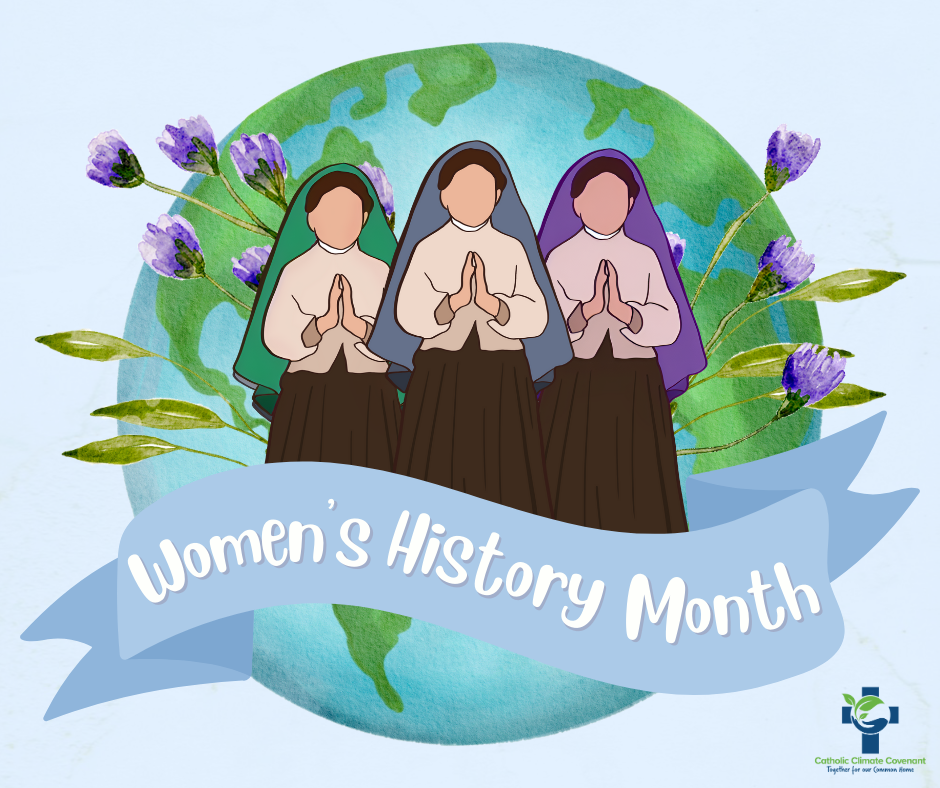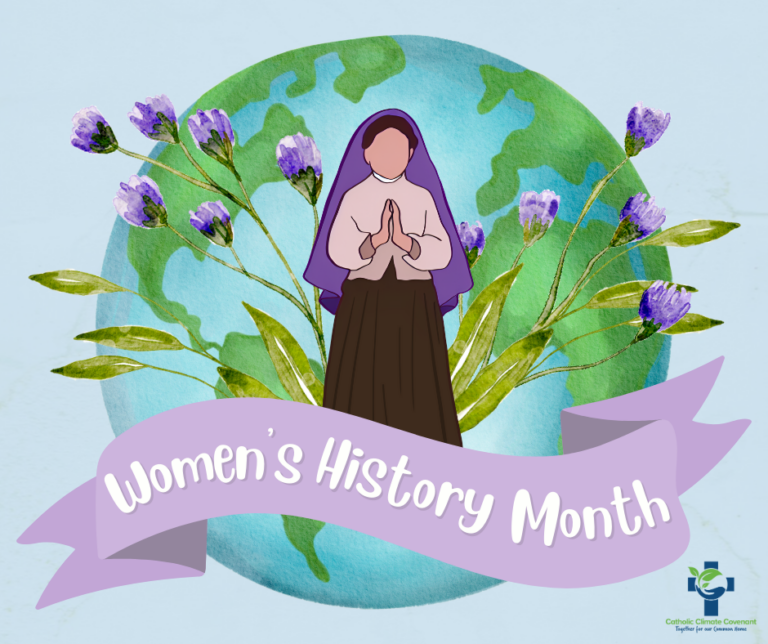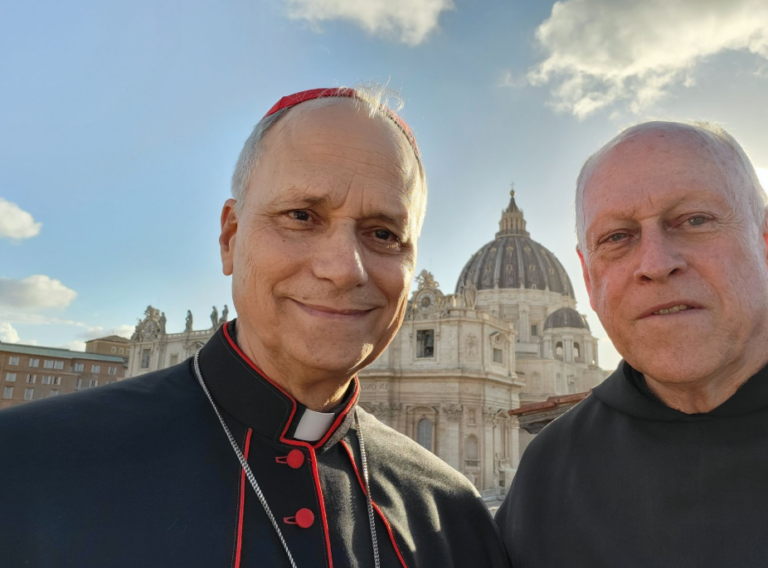As we celebrate Women’s History Month, it is important to reflect on the significant contributions that women, particularly sisters, nuns, and all women religious, have made to the Catholic Church’s mission of caring for creation. In the U.S., these women have long been at the forefront of environmental advocacy, embodying the call to stewardship of the Earth outlined in Scripture and affirmed by the Church. Their work is a testament to the integral role of women in shaping a more just and sustainable world, following the teachings of the Catholic faith.
At the heart of Catholic Social Teaching is a deep reverence for God’s creation. The Church has long emphasized the moral imperative to care for creation as part of the broader responsibility to protect human dignity and the common good. In Laudato Si’, Pope Francis reminds us, “The earth, our home, is beginning to look more and more like an immense pile of filth” (LS 21). Women religious have responded to this call with compassion, leadership, and resilience.
Women religious in the U.S. have been instrumental in promoting environmental justice and advocating for sustainable practices. As educators, activists, missionaries, and community leaders, they have worked tirelessly to address issues such as climate change, pollution, and the depletion of natural resources, particularly in marginalized communities.
One of the earliest examples of women religious stepping into environmental advocacy occurred in the 1970s when the U.S. Catholic Sisters’ Environmental Justice Program was founded by the Leadership Conference of Women Religious (LCWR). This program brought together sisters to advocate for environmental policies that protected both people and the planet. This initiative set the stage for future efforts led by women religious in the environmental space.
A powerful example of their leadership is seen in the Sisters of St. Francis of Philadelphia, who have long been committed to sustainability. In 2003, they launched a comprehensive environmental sustainability program that included green building practices, sustainable farming, and community education. The Sisters of Mercy, who are active in environmental justice, also work globally and locally to fight against climate change and to protect the vulnerable communities most affected by environmental degradation. The Our Lady of Victory Missionary Sisters has worked with the Covenant for years to award big grants and small grants for creation care and net zero projects across the country.
Numerous women religious communities have made sustainability a core part of their daily lives and ministry.
The Sisters of Charity of Cincinnati have adopted a climate-conscious lifestyle by reducing their energy use, utilizing solar panels, and working to ensure that their investments align with their commitment to environmental stewardship. The Congregation of Notre Dame has long advocated for the care of creation, launching initiatives in eco-spirituality and promoting environmental sustainability in their schools, parishes, and ministries across the country.
These are just a few of the examples of women religious who have set out to care for creation — data reveals that women religious have not only led by example but also empowered others to take action. According to a 2018 report by the LCWR, nearly 85% of U.S. sisters reported engaging in environmental advocacy or educational initiatives within their communities. Their advocacy is built on a strong theological foundation, emphasizing that caring for the Earth is intrinsic to living out the Gospel.

The impact of women religious extends beyond their communities and into the broader realm of policy and advocacy. They have been integral in movements such as the Interfaith Power & Light initiative (such as the leadership Sister Joan Brown, OSF, provided as Executive Director of New Mexico Interfaith Power and Light), which mobilizes faith communities to take action on climate change. The Sisters of St. Joseph of Peace were early advocates for climate action, working on national campaigns to reduce carbon emissions and protect ecosystems. Many women religious have also been involved in lobbying for policies that protect the most vulnerable from the impacts of climate change, including marginalized communities and people living in poverty.
This engagement with policy aligns with the Catholic Church’s teachings on justice and the environment, especially as outlined in the Catechism of the Catholic Church, which states: “The Church has been called to take up the cause of justice, peace, and the care of creation as one of its most important tasks” (CCC 2407). Women religious continue to champion these issues in both local and global contexts, demonstrating the interconnectedness of social justice and environmental stewardship.
Catholic women religious draw deeply from Scripture in their care for creation. From the Book of Genesis, we learn that humans are called to “till and keep” the Earth (Genesis 2:15), a mandate that women religious have embraced as part of their vocation. St. Francis of Assisi, whom many women religious admire and name their religious orders after, famously called all creatures “brother” and “sister,” recognizing the kinship among all living things. His example continues to inspire women religious in their dedication to creation care.
Pope Francis’ Laudato Si’ provides a clear theological basis for women religious’ creation care work, offering an invitation to “hear both the cry of the Earth and the cry of the poor” (LS 49). This dual listening calls women religious to address the intersectionality of climate change, poverty, and social justice in their ministries.
The Future of Women Religious and Environmental Stewardship
As we look to the future, the role of women religious in environmental care is more critical than ever. Women’s voices continue to shape the conversation on climate change, urging both individuals and institutions to take meaningful action. The commitment to sustainability is evident in the growing number of religious communities in the U.S. that are adopting sustainable practices, from eco-friendly buildings to waste reduction initiatives.
The leadership of women religious in the environmental movement not only demonstrates their role as stewards of creation but also exemplifies the Church’s call for a holistic, inclusive approach to environmental justice. As Pope Francis writes, “Everything is connected” (LS 91), and women religious are leading the way in making those connections between care for the Earth and care for all people.
This Women’s History Month, let us celebrate the countless women religious who have dedicated their lives to the care of creation, following the call of the Gospel and responding to the pressing environmental challenges of our time. Their advocacy, leadership, and stewardship embody the vision of a world where care for the environment is rooted in justice, compassion, and a profound reverence for all life.
Let us honor their work and continue to support their efforts to build a more sustainable, just, and peaceful world for all.
A Prayer for Women’s History Month
Gracious God,
We thank You for the strength, wisdom, and resilience of women throughout history.
May we honor their contributions to our world,
and walk alongside them in the care of Your Creation.
Grant us the courage to act justly,
to protect the earth and its inhabitants,
and to uplift the voices of women in all spaces of life and leadership.
Guide us, Lord, to serve You through compassion,
as we care for the planet and each other,
in the spirit of Your love.
Amen.
As we continue to post more blogs about the work of women religious and Catholic women in creation care, feel free to check out some of our blog spotlights highlighting the work that women have done in the U.S. Church to care for God’s creation.
- Women’s History Month Part 1: Strong women taking strong actions for the environment
- Women’s History Month Part 2: Courageous environmental saints
- Women’s History Month Part 3: Lay and religious efforts at home and abroad
- The Sisters of St. Joseph | Baden, Pennsylvania creation care work
- Franciscan Sisters lead Franciscans for Earth Initiative
- A Franciscan Sister Reflects: Nature and the National Eucharistic Congress




